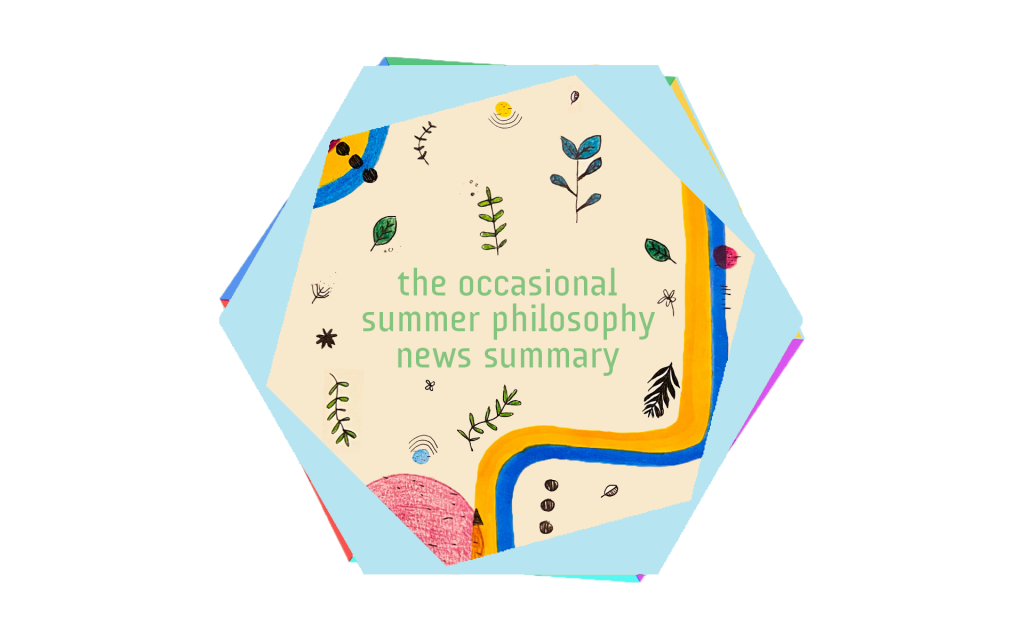Hats off to all the wonderful new talent in U.S. intellectual history! We had an impressive slate of contenders for our reimagined Henry F. May Fund awards this year. So. Read more
The post Meet the 2023 Henry F. May Fund Fellows first appeared on Society for US Intellectual History.
Recent philosophy-related news*, and a request…

1. Stephen Kershnar (SUNY Fredonia), whose February 2022 discussion of adult-child sex on the Brain in a Vat podcast sparked viral outrage and led to his removal from campus, has “filed a lawsuit this week in U.S. District Court in Buffalo asking the court to declare that Fredonia’s administrators violated his First Amendment rights by removing him from the classroom after the comments he made on a podcast kicked off a social-media firestorm,” according to the Buffalo News. The Foundation for Individual Rights and Expression (FIRE) has filed the lawsuit on his behalf, Kershnar says.
UPDATE: Here is the lawsuit and the motion for injunction (via Stephen Kershnar).
2. The editors of Philosophy, the flagship journal of The Royal Institute of Philosophy, have announced the winners of their 2022 Essay Prize, which was on the topic of emotions. They are: Renee Rushing (Florida State) for her “Fitting Diminishment of Anger: A Permissivist Account” and Michael Cholbi for his “Empathy and Psychopaths’ Inability to Grieve.” Mica Rapstine (Michigan) was named the runner-up for his “Political Rage and the Value of Valuing.” The prize of £2500 will be shared between the winners, and all three essays will be published in the October 2023 issue of the journal.
3. Some philosophers are on the new Twitter alternative, Bluesky. Kelly Truelove has a list of those with over 50 followers here. And yes, you can find me (and Daily Nous) on it.
4. One philosopher is among the new members of The American Philosophical Society, a learned society that aims to “honor and engage leading scholars, scientists, and professionals through elected membership and opportunities for interdisciplinary, intellectual fellowship.” It is John Dupré of the University of Exeter, who specializes in philosophy of science. The complete list of new members is here. Professor Dupré joins just 21 other philosophers that have been elected into the society since 1957 (the society was founded in 1743).
5. I’ve decided that some news items I had been planning to include in these summary posts over the summer should instead get their own posts. These are posts about philosophers’ deaths and faculty moves. Regarding the former, it would be wonderful if individuals volunteered to write up memorial notices for philosophers they knew, or whose work they are familiar with, including at least the kinds of information I tend to include in these posts (see here). Recently, philosophers Henry Allison, Richard W. Miller, and Donald Munro have died. If you are interested in writing up a memorial notice for one of them, please email me. Generally, over the summer, these posts and faculty move notices may take longer to appear than usual.
* Over the summer, many news items will be consolidated in posts like this.

The post Philosophy News Summary (updated) first appeared on Daily Nous.
We are delighted to announce that the annual Leo P. Ribuffo Dissertation Prize has been awarded to Erik Baker (Harvard University), for “Entrepreneurial: Management Expertise & the Reinvention of the Read more
The post Announcement: 2023 Leo P. Ribuffo Dissertation Prize first appeared on Society for US Intellectual History.
We are pleased to announce the winner of the 2023 Dorothy Ross Prize for the best article in U.S. intellectual history. This award goes to an emerging scholar, defined as Read more
The post Announcement: 2023 Dorothy Ross Prize first appeared on Society for US Intellectual History.
We are honored to announce that the 2023 S-USIH Annual Book Prize has been awarded to Kathryn Gin Lum (Stanford University) for Heathen: Religion and Race in American History (Harvard Read more
The post Announcement: S-USIH 2023 Annual Book Prize first appeared on Society for US Intellectual History.
The British Journal for the History of Philosophy has announced the winners of three of its prizes.
The journal awarded the 2022 Rogers Prize—its annual prize for the best article it publishes—to Michael Kremer (University of Chicago) for his paper “Margaret MacDonald and Gilbert Ryle: a philosophical friendship”. Here’s the abstract of his article:
This article considers the personal and philosophical relationship between two philosophers, Margaret MacDonald and Gilbert Ryle. I show that a letter from MacDonald to Ryle found at Linacre College, Oxford, was part of an extensive correspondence, and that the two were intimate friends and philosophical interlocutors, and I explore the relationship between their respective philosophies. MacDonald, who studied with Wittgenstein before coming to Oxford in 1937, deployed and developed Wittgensteinian themes in her own subsequent work. I show that this work was an important source of ideas in Ryle’s philosophy. I examine two episodes: (1) a 1937 symposium in which MacDonald gave the lead paper, and Ryle was a respondent—I argue that Ryle derived his famous distinction between knowledge-how and knowledge-that from her paper; and (2) Ryle’s rejection in Dilemmas (1953/4) of the central importance of the idea of a ‘category mistake’—I argue that this may have been in response to MacDonald’s critical review of The Concept of Mind. Along the way I consider the development of MacDonald’s metaphilosophical views, and I shed new light on MacDonald’s remarkable biography.
This article and the topic of underappreciated philosophical friendships were discussed previously at Daily Nous here.

clockwise from top left: Michael Kremer, Lea Cantor, Michael Morgan, and Claudia Dumitru
The winner of the Rogers Prize receives £1,000. The prize was established in 2012 in honor of John Rogers, the founding editor of the journal.
The journal awarded its Beaney Prize—its annual prize for the best contribution to widening the canon it publishes—to Lea Cantor (University of Oxford) for her paper “Thales – the ‘first philosopher’? A troubled chapter in the historiography of philosophy”. Here’s the abstract of her article:
It is widely believed that the ancient Greeks thought that Thales was the first philosopher, and that they therefore maintained that philosophy had a Greek origin. This paper challenges these assumptions, arguing that most ancient Greek thinkers who expressed views about the history and development of philosophy rejected both positions. I argue that not even Aristotle presented Thales as the first philosopher, and that doing so would have undermined his philosophical commitments and interests. Beyond Aristotle, the view that Thales was the first philosopher is attested almost nowhere in antiquity. In the classical, Hellenistic, and post-Hellenistic periods, we witness a marked tendency to locate the beginning of philosophy in a time going back further than Thales. Remarkably, ancient Greek thinkers most often traced the origins of philosophy to earlier non-Greek peoples. Contrary to the received view, then, I argue that (1) vanishingly few Greek writers pronounced Thales the first philosopher; and (2) most Greek thinkers did not even advocate a Greek origin of philosophy. Finally, I show that the view that philosophy originated with Thales (along with its misleading attribution to the Greeks in general) has roots in problematic, and in some cases manifestly racist, eighteenth-century historiography of philosophy.
The winner of the Beaney Prize receives £1,000. The prize was established in 2021 in honour of Mike Beaney, Editor of the journal from 2011 to 2021.
Lastly, the journal awarded its Best Graduate Essay Prize for 2022 to Claudia Dumitru (
The Graduate Essay Prize is £1000, and is awarded annually to the writer of an essay that makes a significant contribution to the history of philosophy. The competition is open to all graduate students, anywhere in the world, studying any subject.